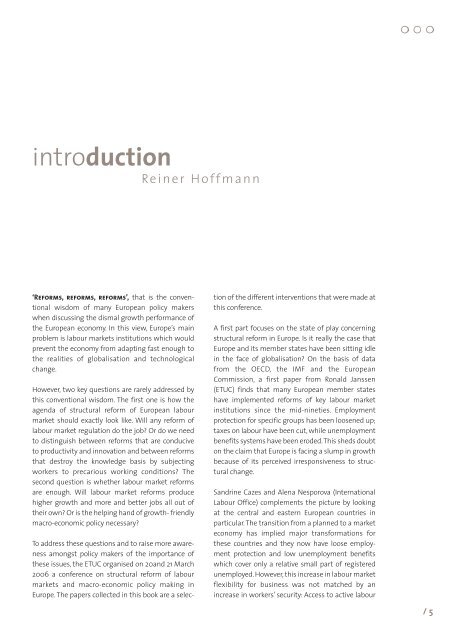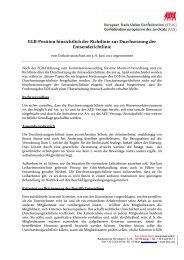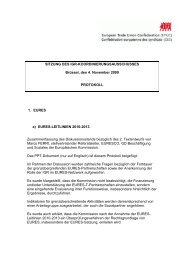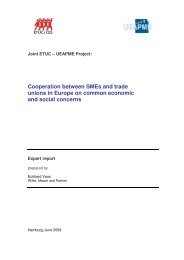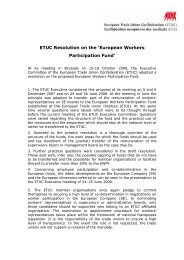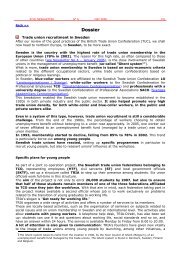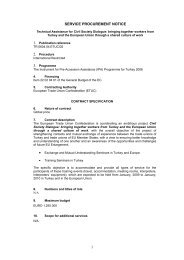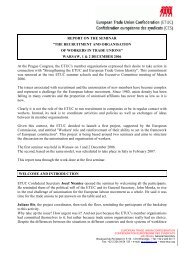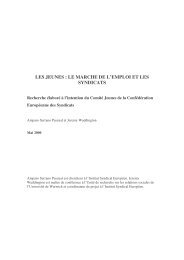Structural reforms and macro-economic policy - ETUC
Structural reforms and macro-economic policy - ETUC
Structural reforms and macro-economic policy - ETUC
Create successful ePaper yourself
Turn your PDF publications into a flip-book with our unique Google optimized e-Paper software.
PART I:<br />
introduction<br />
Reiner Hoffmann<br />
‘Reforms, <strong>reforms</strong>, <strong>reforms</strong>’, that is the conventional<br />
wisdom of many European <strong>policy</strong> makers<br />
when discussing the dismal growth performance of<br />
the European economy. In this view, Europe’s main<br />
problem is labour markets institutions which would<br />
prevent the economy from adapting fast enough to<br />
the realities of globalisation <strong>and</strong> technological<br />
change.<br />
However, two key questions are rarely addressed by<br />
this conventional wisdom. The first one is how the<br />
agenda of structural reform of European labour<br />
market should exactly look like. Will any reform of<br />
labour market regulation do the job? Or do we need<br />
to distinguish between <strong>reforms</strong> that are conducive<br />
to productivity <strong>and</strong> innovation <strong>and</strong> between <strong>reforms</strong><br />
that destroy the knowledge basis by subjecting<br />
workers to precarious working conditions? The<br />
second question is whether labour market <strong>reforms</strong><br />
are enough. Will labour market <strong>reforms</strong> produce<br />
higher growth <strong>and</strong> more <strong>and</strong> better jobs all out of<br />
their own? Or is the helping h<strong>and</strong> of growth- friendly<br />
<strong>macro</strong>-<strong>economic</strong> <strong>policy</strong> necessary?<br />
To address these questions <strong>and</strong> to raise more awareness<br />
amongst <strong>policy</strong> makers of the importance of<br />
these issues, the <strong>ETUC</strong> organised on 20<strong>and</strong> 21 March<br />
2006 a conference on structural reform of labour<br />
markets <strong>and</strong> <strong>macro</strong>-<strong>economic</strong> <strong>policy</strong> making in<br />
Europe. The papers collected in this book are a selec-<br />
tion of the different interventions that were made at<br />
this conference.<br />
A first part focuses on the state of play concerning<br />
structural reform in Europe. Is it really the case that<br />
Europe <strong>and</strong> its member states have been sitting idle<br />
in the face of globalisation? On the basis of data<br />
from the OECD, the IMF <strong>and</strong> the European<br />
Commission, a first paper from Ronald Janssen<br />
(<strong>ETUC</strong>) finds that many European member states<br />
have implemented <strong>reforms</strong> of key labour market<br />
institutions since the mid-nineties. Employment<br />
protection for specific groups has been loosened up;<br />
taxes on labour have been cut, while unemployment<br />
benefits systems have been eroded.This sheds doubt<br />
on the claim that Europe is facing a slump in growth<br />
because of its perceived irresponsiveness to structural<br />
change.<br />
S<strong>and</strong>rine Cazes <strong>and</strong> Alena Nesporova (International<br />
Labour Office) complements the picture by looking<br />
at the central <strong>and</strong> eastern European countries in<br />
particular. The transition from a planned to a market<br />
economy has implied major transformations for<br />
these countries <strong>and</strong> they now have loose employment<br />
protection <strong>and</strong> low unemployment benefits<br />
which cover only a relative small part of registered<br />
unemployed. However, this increase in labour market<br />
flexibility for business was not matched by an<br />
increase in workers’ security: Access to active labour<br />
/ 5


